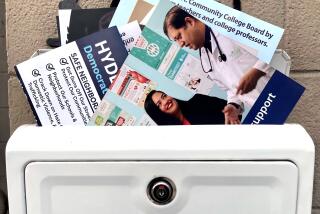Military Battling Junk E-Mail
- Share via
When the 5,500 sailors aboard the aircraft carrier Abraham Lincoln in the Persian Gulf get their daily half-an-hour allotment of Internet time, they savor each precious second to connect with the world back home.
Apparently, it’s a world full of folks cooking with the ultimate pasta pot, making six-figure incomes selling junk on EBay and using anti-snoring spray to sleep quietly through the night.
Such are the wares touted in millions of e-mail messages. The unsolicited advertisements -- contemptuously known as spam -- have been clogging corporate computer systems and home PC in-boxes for years, costing an estimated $8.9 billion annually, according to technology market research firm Ferris Research.
And now the ads have followed U.S. troops to the Middle East.
“Spam is bad enough when you’re here in the States on a high-speed connection,” said Enrique Salem, chief executive of San Francisco-based Brightmail Inc., a leading provider of anti-spam software whose clients include the military and the government.
“It’s painful when you’re in the middle of a war.”
Even with the best software filters the military can deploy, marketing pitches for dubious products and questionable financial schemes are slipping into the mix with letters from family and friends back home.
It’s not that the military hasn’t tried to fight it.
Over the last few years, the Defense Department has issued guidelines to each of the branches of the armed services, advising that unnecessary communication and misuse of military bandwidth are to be avoided at all costs.
The Defense Information Systems Agency also has established general technical standards for filtering spam.
The Army, Navy, Air Force, Marines and Coast Guard are responsible for setting up and managing the filters and firewalls designed to block e-mail marketing campaigns on their own computer networks, said Pentagon spokesman Lt. Col. Gary Keck.
By obstructing spam, the barriers can prevent networks from slowing down or crashing.
“We don’t tell them what programs to buy,” Keck said. “Whatever they want to do is fine, as long as it works.”
Military officials won’t talk about the specific tools they use to fight spam, citing concerns about alerting hackers and other potential attackers. That makes it impossible to judge whether they’re any better at killing spam than corporate America is.
But both often turn to the same technology for help.
Air Force officials say they have installed off-the-shelf filtering and firewall software at their U.S. bases, hoping that will protect their servers and prevent spam from reaching the branch’s men and women overseas.
The Air Force also avoids listing its proxy and domain name server addresses in public directories to make it more difficult for e-mail marketers to target its systems, said Maj. Stephanie Holcombe, an Air Force spokeswoman.
“If you’re reading your e-mail off our servers and you’re over there” in the Persian Gulf, Holcombe said, “the chances of getting spammed are lower. But if you’re over there and using Yahoo or Hotmail, you’re going to be spammed, no doubt.”
The wave of unsolicited marketing e-mail seems unstoppable, rising about sixfold last year alone. This year, spam is expected to reach the milestone of accounting for half of all corporate e-mail, according to researchers with Aberdeen Group.
“Everyone has to deal with spam, even the military,” said Karl Jacob, chief executive of Cloudmark Inc., a provider of anti-spam software. Last month alone, the San Francisco-based firm saw a 20% increase in use of its desktop program, SpamNet, by people whose e-mail addresses have the “.mil” suffix.
Increasingly, spam is hiding behind a patriotic shield. Cloudmark executives found two recent e-mails that tried to lure recipients by referring to the war in the subject line.
One, with the subject line “Support America,” is an ad for T-shirts. Another, labeled “Iraqi peasant crashed in an American helicopter,” is actually a solicitation for an X-rated Web site.
Fears of a backlash against online pitches recently prompted the Direct Marketing Assn. to issue its members a list of “common-sense strategies” to guide them during the war in Iraq.
“Don’t mail commercial messages to soldiers during the conflict,” the list advises. “Although it probably goes without saying, mailing commercial messages to our nation’s servicemen and women during the conflict is not appropriate.”
Aboard the Abraham Lincoln, crew members cram into the Library Internet lounge throughout the day. Cramped but clean, the metal partitions between the PCs create a semblance of privacy on the bustling ship.
As Seaman Mariliz Sambrana, a 19-year-old mess specialist from Puerto Rico, sits down at the keyboard, a sign nearby warns that eating, drinking and littering are prohibited.
Also not allowed, states the post, is using the computer for financial gain, fund-raising, gambling, partisan political activity, pornography, pirating, proselytizing -- and sending spam.
Though the military tries mightily to block spam from its own computers, it has found some redeeming value in the pesky e-mails.
In January, the U.S. flooded the in-boxes of Iraqi military and civilian leaders, urging them to turn against President Saddam Hussein. Titled “Important Information,” the Arabic messages urged readers to “protect their families” and reveal the location of any chemical, biological or nuclear weapons.
The Iraqi government responded by temporarily shutting down Internet access throughout the country.
“When you are at war, e-mail becomes a different form of a weapon,” said Salem of Brightmail. “Think of all the leaflets we’ve dropped on Iraq. There’s no difference between that and sending e-mails.”
Times staff writers Alex Pham in Los Angeles and Carol Williams in the Persian Gulf contributed to this report.






